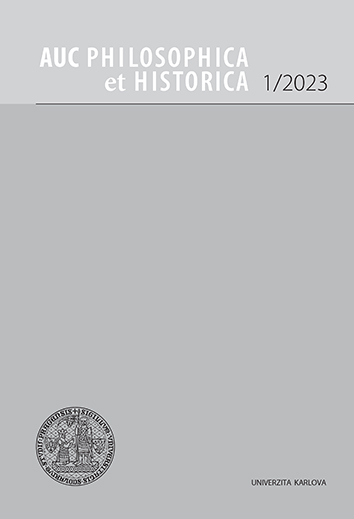AUC Philosophica et Historica (Acta Universitatis Carolinae Philosophica et Historica) is a multidisciplinary academic journal focused on the humanities with more than 50 years of tradition.
The journal is indexed in CEEOL, DOAJ, and EBSCO.
AUC PHILOSOPHICA ET HISTORICA, Vol 2015 No 2 (2015), 57–79
Koncepce a priori Mikela Dufrenna
[Mikel Dufrenne’s Concept of the A priori]
Felix Borecký
DOI: https://doi.org/10.14712/24647055.2016.4
published online: 06. 06. 2016
abstract
The principle aim of this essay is to present Mikel Dufrenne’s conception of the a priori as an effort to overcome the sociological and historical relativism that dominates in aesthetics as in all other human sciences. Dufrenne endeavours to show that the understanding of sense cannot be derived only from an empirical framework. It does not suffice to consider only that what one has experienced or the habits, norms and values of the society in which one has grown up and by means of which one perceives reality (common sense); human beings also have a priori constants that are of crucial significance for cognition. The second section of the article presents an interpretation of how Dufrenne delimits his conception of the a priori against epistemology, and, mainly, in the third section, against Kant. The article continues, in the fourth and the sixth section respectively with an endeavour to overcome subjectivism and intellectualism, and focuses, in the fifth section, on the a priori as a historical concept that is inseparably connected with the imaginary (discussed in the seventh section). All these points are completely heterogeneous with the traditional delimitations of the a priori according to the rules of logic. Dufrenne’s notion of the a priori constitutes an original contribution to solving the problem of cognitio sensitiva, which deals with the question of the extent to which it is possible to recognize universal truths on a sensuous individual being. Dufrenne is convinced that the aesthetic aspects of experience, such as the sensuous, the imaginary, and the corporeal, are the truest guide to recognition of the deep truths about human being in the world. Here is manifested the a priori basis that is common both to human beings and the world and guaranteed by Nature. The supreme examples of aesthetic phenomena are works of art and the supreme type of experience is the aesthetic experience.
keywords: Dufrenne; phenomenology; aesthetic experience; the a priori; historicity; cognition; sentiment; being in the world; Nature; the sensuous; the imaginary
periodicity: 2 x per year
ISSN: 0567-8293
E-ISSN: 2464-7055
